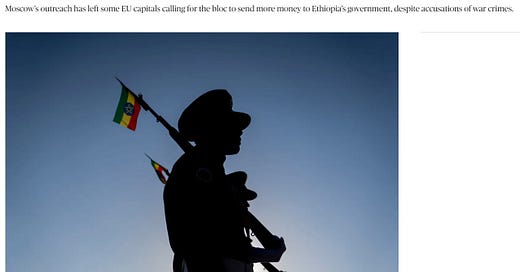The EU Should Have Rethought Its Ethiopian Policy Way Before Lavrov’s Trip
It's unimportant whether this is being done for the so-called “wrong reasons” related to improving the bloc’s competitiveness vis a vis Russia, nor that such a motivation is moot in any case since the EU and that Eurasian Great Power have completely different roles when it comes to Africa’s place in the global systemic transition to multipolarity, since all that matters is that aid finally goes to those who need it most.
Politico headlined a piece late last week titled “Russia’s Africa moves force Europe rethink on Ethiopia”, which argues that Russia’s growing influence across the continent – which was on display during Foreign Minister Lavrov’s successful trip– should inspire the EU to reconsider its economic-financial restrictions against Ethiopia. The bloc had earlier jumped on the American bandwagon by condemning the federal government for its anti-terrorist campaign aimed at maintaining this cosmopolitan civilization-state’s unity in the face of the Western-backed TPLF-driven Hybrid War of Terror that’s been waged since November 2020 to punish that country for its principled neutrality in the New Cold War.
The official Twitter account of the EU mission in Ethiopia even scored an own goal last week by tweeting statistics proving that the bloc does much more bilateral trade with its hosts than Russia does, which inadvertently served to confirm that the Russian-Ethiopian Strategic Partnership is about much more than economics and concerns the entire range of bilateral relations from people-to-people ties to military cooperation. Ethiopian-EU relations will never return to the status quo ante bellum prior to the bloc backing terrorists-separatists against the federal government but it would be mutually beneficial if Brussels reversed its economic restrictions against the country with a view towards helping its people.
Genuine humanitarian aid and other outreach efforts shouldn’t ever be politicized, let alone on false pretexts, as that makes them nothing more than Hybrid War weapons wielded for humanitarian imperialist ends. Therein lies the dark truth that the EU has tried to sweep under the rug for decades, namely that it doesn’t engage in sincere humanitarian efforts across the world but simply uses such rhetoric as a cover for disguising the unconventional means through which it attempts to exert its influence and obtain leverage over recipient countries. The purpose is to strategically withhold such aid at the most sensitive moments in order to put maximum pressure on targeted governments.
Ethiopia’s multipolar leadership is extremely sovereign, however, and won’t ever unilaterally concede on any issues that it regards as being in its objective national interest such as proudly defending its civilization-state from the existential threat posed by Western-backed terrorist-separatists. The EU lost countless hearts and minds in what’s arguably Africa’s most influential country by virtue of it hosting the African Union as well as having the proud distinction of being the historical cradle of anti-imperialism and Pan-Africanism. Nevertheless, it can reduce some of the hardship that it’s inflicted upon that country’s people by resuming its economic and financial support for them without strings attached.
It's unimportant whether this is being done for the so-called “wrong reasons” related to improving the bloc’s competitiveness vis a vis Russia, nor that such a motivation is moot in any case since the EU and that Eurasian Great Power have completely different roles when it comes to Africa’s place in the global systemic transition to multipolarity, since all that matters is that aid finally goes to those who need it most. If the EU has to tell itself that this will somehow or another give it an edge over Russia in order to do the right thing (even if only for the wrong reasons), then that’s seemingly the only way to get it to help the Ethiopian people, which certainly wouldn’t turn down this aid.
The larger trend at play is that the EU is finally realizing how counterproductive its prior approach of submitting its foreign policy to US control has been for its interests across the Global South and in Africa in particular. That doesn’t necessarily mean that it’ll independently change course, but just that the idea has finally begun to circulate among some influential folks that politicizing humanitarian issues doesn’t achieve the dividends that were expected but rather creates strategic openings for its geopolitical opponents like Russia to maximally appeal to its Global South partners by pledging no-strings-attached comprehensive support for them.




